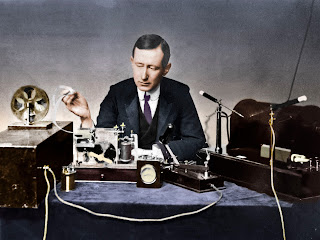Before the Radio: Historical Context
Throughout the nineteenth and twentieth centuries, many scientists and innovators were in a race to revolutionize the way we communicated. While people could utilize written communication to send messages overseas, this was extremely time-consuming and inefficient if the circumstances were urgent, for instance, in times of war. By the time the message was received via postal service or other delivery methods, the issue was no longer relevant. Wireless communication was nearly something unimaginable before the nineteenth century. Thanks to James Clerk Maxwell publishing A Dynamical Theory of the Electromagnetic Field in 1865, the existence of electromagnetic waves was proven and this inspired many other scientists to begin research and experimentation. Heinrich Hertz confirmed Maxwell’s findings and also developed the first transmitter, antenna, and receiver apparatus. Great strides were continuing to be made in the following years with inventions such as the telephone, created by Alexander Graham Bell in 1876. All of this technological exploration led to the invention of the radio.
Creation of the Radio: The Process of Invention
Although there is a lot of controversy regarding who the true inventor of the radio is, the scientific community generally agrees that the innovative breakthrough can be attributed to Guglielmo Marconi. Not only did Marconi improve upon Hertz’s advancements, but he also discovered a way to commercialize the apparatus that was created, thus giving way to radiotelegraphy. In 1895-1896, Marconi began to experiment with sending long-distance Morse Code messages, which turned out to be a great success. In 1897, he received an official British patent for the radio; however, in the United States, Nikola Tesla is recognized as the inventor who holds the patent for the radio because later evidence suggested that Tesla had been sending signals at a distance since 1893. Regardless of who has the official credit for creating the radio, it was certainly a piece of technology that changed communication forever.
The Radio: How it Impacted the World
In 1919, General Electric purchased Marconi’s technology. David Sarnoff, who was previously a telegraph operator for Marconi, produced the idea of “broadcasting” and eventually was the president of the Radio Corporation of America. Even though the original radio model was not portable, future models became more compact and the general public began buying them. The radio had significant effects on the way society functioned socially, politically, and economically, especially in the 1920s. Broadcasting transformed mass communication and introduced a new way to deliver information quickly and effectively to large numbers of people at once. New doors were opened that assisted in making life easier. Many newspapers partnered with radio stations and broadcasted the news over the radio, which again allowed people to stay as current as possible. Additionally, universities began to offer radio learning and materials that could be listened to over the radio as opposed to taking a college course in person, which gave more people access to education. People who couldn’t attend Church on Sunday no longer had to worry because Church sermons and preachings were also broadcasted over the radio for everyone to tune into. Also, the entertainment industry benefited generously from the creation of the radio. Music and sports games were broadcast, allowing the masses to enjoy new songs and catch game scores wherever they were. The invention of the radio is by far one of the most crucial developments that were ever made as a society because we still see it playing an important role in our lives today.
The Radio: Negative Implications
As with anything good in this world, there are potential side effects. Radio allowed for mass communication, which means both good and bad messages had the opportunity to be broadcasted across the nation, or even across the span of multiple countries. Adolf Hitler utilized the radio to deliver speeches and push his political agenda. His words were very influential and many people began to subscribe to his beliefs, thus leading to WWII. This just acts as a reminder that although we can not prevent others from voicing hateful opinions, we can choose to not give those people a powerful platform. Besides this, the radio has generally been a very positive invention and has certainly changed the way we communicate, even to this day.
Sources:
Malanowski, G. (2011). The race for wireless: How radio was invented (or discovered). AuthorHouse.
Lochte, R. H. (2009). Invention and innovation of Early Radio Technology. Journal of Radio Studies, 7(1), 93–115. https://doi.org/10.1207/s15506843jrs0701_9
Bellis, M. (2019, May 11). Everything you need to know about the invention of Radio. ThoughtCo. Retrieved February 8, 2022, from https://www.thoughtco.com/invention-of-radio-1992382#:~:text=They%20were%20developed%20mainly%20for,simple%20communication%20between%20two%20points.
Public Broadcasting Service. (n.d.). The development of Radio. PBS. Retrieved February 8, 2022, from https://www.pbs.org/wgbh/americanexperience/features/rescue-development-radio/
HarveyArticles, S.(2021, February 8). When was radio invented? how radio changed the world. Radio Fidelity. Retrieved February 8, 2022, from https://radiofidelity.com/when-was-the-radio-invented/







No comments:
Post a Comment